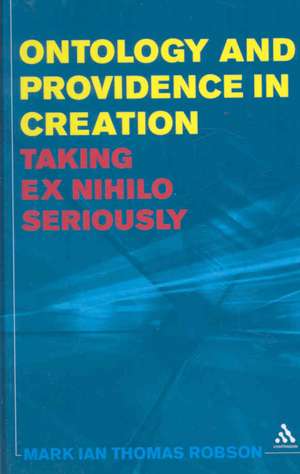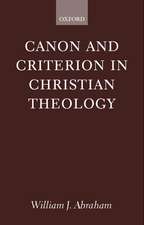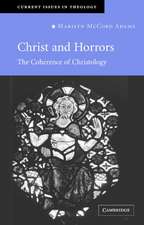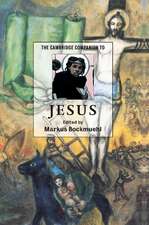Ontology and Providence in Creation: Taking ex nihilo Seriously
Autor Dr. Mark Ian Thomas Robsonen Limba Engleză Hardback – 31 iul 2008
Ontology and Providence in Creation critically examines a particular Leibnizean inspired understanding of God's creation of the world and proposes that a different understanding should be adopted. The Leibnizean argument proposes that God's understanding encompassed a host of possible worlds, only one of which he actualized. This proposition is the current orthodoxy when philosopher and theologians talk about the philosophical understanding of creation.
Mark Robson argues that this commits the Leibnizean to the notion that possibility is determinate. He proposes that this understanding of creation does not do justice to the doctrine that God created the world out of nothing. Instead of possible worlds, Robson argues that we should understand possibility as indeterminate. There are no things in possibility, hence God created out of nothing. He examines how this conception of possibility is held by C.S. Peirce and how it was developed by Charles Hartshorne. Robson contends that not only does the indeterminate understanding of possibility take seriously the nothing of ex nihilo, but that it also offers a new solution to the problem of evil.
Mark Robson argues that this commits the Leibnizean to the notion that possibility is determinate. He proposes that this understanding of creation does not do justice to the doctrine that God created the world out of nothing. Instead of possible worlds, Robson argues that we should understand possibility as indeterminate. There are no things in possibility, hence God created out of nothing. He examines how this conception of possibility is held by C.S. Peirce and how it was developed by Charles Hartshorne. Robson contends that not only does the indeterminate understanding of possibility take seriously the nothing of ex nihilo, but that it also offers a new solution to the problem of evil.
| Toate formatele și edițiile | Preț | Express |
|---|---|---|
| Paperback (1) | 256.95 lei 43-57 zile | |
| Bloomsbury Publishing – 2 noi 2011 | 256.95 lei 43-57 zile | |
| Hardback (1) | 890.45 lei 43-57 zile | |
| Bloomsbury Publishing – 31 iul 2008 | 890.45 lei 43-57 zile |
Preț: 890.45 lei
Preț vechi: 1141.06 lei
-22% Nou
Puncte Express: 1336
Preț estimativ în valută:
170.44€ • 185.20$ • 143.26£
170.44€ • 185.20$ • 143.26£
Carte tipărită la comandă
Livrare economică 21 aprilie-05 mai
Preluare comenzi: 021 569.72.76
Specificații
ISBN-13: 9781847062154
ISBN-10: 1847062156
Pagini: 240
Dimensiuni: 156 x 234 x 14 mm
Greutate: 0.51 kg
Editura: Bloomsbury Publishing
Colecția Continuum
Locul publicării:London, United Kingdom
ISBN-10: 1847062156
Pagini: 240
Dimensiuni: 156 x 234 x 14 mm
Greutate: 0.51 kg
Editura: Bloomsbury Publishing
Colecția Continuum
Locul publicării:London, United Kingdom
Caracteristici
The book has two excellent endorsements, including one from Charles Talliaferro, a leading Philosopher of Religion.
Cuprins
Introduction
Chapter One: Leibniz's Ontology of Possibility
Chapter Two: The Ontology of Modern Modal Theories
Chapter Three: Alternative Account Concerning Possibilia (An examination of C S Peirce's account of possibility and its development by Charles Hartshorne)
Chapter Four: Vagueness and the Indeterminateness of Possibility (An examination of the idea of vagueness in philosophical logic and an account of how it relates to the notion of indeterminate possibility)
Chapter Five: Knowledge, Possibility and Ockham's Theory of Divine Ideas
Chapter Six: Divine Capacity (An argument that indeterminate possibility is best understood on the model of capacities to do things)
Chapter Seven: Theories of Providence
Chapter Eight: Moral and Providential Consequences of the Notion of Indeterminate Possibility
Chapter Nine: God and Chance (An account of how the notion of chance is introduced by the notion of indeterminate possibility and how it might connect with some accounts of Genesis)
Chapter Ten: The Notion of Creativity (An investigation into the concept of creativity and how various models for the creative act are employed by various thinkers)
Chapter Eleven: Externalism and the Creation of Meaning (An argument that God in creating the world creates new meanings that did not previously exist)
Conclusion
Chapter One: Leibniz's Ontology of Possibility
Chapter Two: The Ontology of Modern Modal Theories
Chapter Three: Alternative Account Concerning Possibilia (An examination of C S Peirce's account of possibility and its development by Charles Hartshorne)
Chapter Four: Vagueness and the Indeterminateness of Possibility (An examination of the idea of vagueness in philosophical logic and an account of how it relates to the notion of indeterminate possibility)
Chapter Five: Knowledge, Possibility and Ockham's Theory of Divine Ideas
Chapter Six: Divine Capacity (An argument that indeterminate possibility is best understood on the model of capacities to do things)
Chapter Seven: Theories of Providence
Chapter Eight: Moral and Providential Consequences of the Notion of Indeterminate Possibility
Chapter Nine: God and Chance (An account of how the notion of chance is introduced by the notion of indeterminate possibility and how it might connect with some accounts of Genesis)
Chapter Ten: The Notion of Creativity (An investigation into the concept of creativity and how various models for the creative act are employed by various thinkers)
Chapter Eleven: Externalism and the Creation of Meaning (An argument that God in creating the world creates new meanings that did not previously exist)
Conclusion
Recenzii
'Robson has made great progress on a central but neglected area of philosophy of religion. In a way, it is surprising that this kind of book has not been written before. Robson's work is essential reading for anyone interested in the philosophy of theism and creation.' Charles Taliaferro, Professor of Philosophy, St. Olaf College, Minnesota, USA
'This a bold book which offers a genuine and original contribution to both philosophical and theological debates. The ease, confidence and lucidity with which Robson discusses the philosophical and theological doctrines of a wide range of authors is very impressive. He also displays a remarkable mastery of both the history of philosophy and contemporary debates in philosophy and theology, drawing not only from the Anglo-American analytical tradition but also from the reflection of continental authors.' Maria Rosa Antognazza, Reader in Philosophy of Religion, King's College London, UK
'In considering creation in the light of providence and the problem of evil the almost invariant starting point is the assumption that God had in prospect a set number of options between which he was forced to choose. In this fascinating and well-written book, Mark Robson challenges that claim, contending that there are good philosophical reasons for believing that, prior to their actual existence, concepts and the possibilities inherent in them have no determinate meaning. So even God must respond to what actually emerges. It is an idea that could radically alter the way in which we think of God, creation and evil.' Professor David Brown, FBA University of St Andrews
'An eminently readable contribution to the field. Robson draws in an illuminating way on a wide range of material - ambitious, constructive, confidently and clearly held together- displaying real independence of thought.' Ann Loades CBE, Professor Emerita, University of Durham; Professorial Fellow, St Chad's College, Durham.
'Robson's thesis is intriguing and, in my view, persuasive. [...] In Robson's view, an emphasis on divine predestination implies that creation cannot be simply because God creates with something in mind. (This is, I believe, a very important insight; certainly, I do not recall ever coming across it before, and it will be interesting to see if anything is made of it in future dialogue.) Moreover, if God does create with something in mind, the implication is that all that transpires in the created order is fixed, determined in advance. [...] Thus for Robson, a world created ex nihilo is genuinely novel and so genuinely free. [...] The affinities with movements such as open theism cannot be avoided; but Robson flashes a card seldom played before: Given all that has been argued about God's act of creation, it follows that God did not know -- indeed, could not know -- that evil would enter the world. [...] Evil, for Robson, can only emerge in a world that is genuinely novel, genuinely free and genuinely other from God, as creatures exercise their own capacities for creativity. [...] [Robson] has challenged many dearly-held presuppositions concerning the meaning and implications of creatio ex nihilo and, as a result, has laid a modest but stable foundation for future discussions.' American Theological Inquiry, Volume 3, No. 1, 2010 (review by Terry J. Wright, Spurgeon's College, London)
'Robson's book is an exercise in philosophical theology that is noteworthy for its engagement of contemporary Analytic metaphysics of modality, themes from Pragmatist and Process thought and concerns of Christian tradition without being slavishly beholden to any of them. [...] Robson seeks a kind of theism that is deeply traditional in taking the notions of divine self-sufficiency and creation ex nihilo in a strong sense, but which eschews any notion of God's relation to the world which, in emphasizing God's glory, tends so to stress God's unqualified being or efficacy that the being of creatures and their contributions to worldly goings on become effectively invisible. Robson's task is to argue for his alternative view. This he has done, in general, plausibly and always, interestingly. [...] Robson develops an account of divine creation and God's relation to the world that is interestingly distinctive.' -- John G. Quilter, Ars Disputandi, Vol. 10 (2010)
'This a bold book which offers a genuine and original contribution to both philosophical and theological debates. The ease, confidence and lucidity with which Robson discusses the philosophical and theological doctrines of a wide range of authors is very impressive. He also displays a remarkable mastery of both the history of philosophy and contemporary debates in philosophy and theology, drawing not only from the Anglo-American analytical tradition but also from the reflection of continental authors.' Maria Rosa Antognazza, Reader in Philosophy of Religion, King's College London, UK
'In considering creation in the light of providence and the problem of evil the almost invariant starting point is the assumption that God had in prospect a set number of options between which he was forced to choose. In this fascinating and well-written book, Mark Robson challenges that claim, contending that there are good philosophical reasons for believing that, prior to their actual existence, concepts and the possibilities inherent in them have no determinate meaning. So even God must respond to what actually emerges. It is an idea that could radically alter the way in which we think of God, creation and evil.' Professor David Brown, FBA University of St Andrews
'An eminently readable contribution to the field. Robson draws in an illuminating way on a wide range of material - ambitious, constructive, confidently and clearly held together- displaying real independence of thought.' Ann Loades CBE, Professor Emerita, University of Durham; Professorial Fellow, St Chad's College, Durham.
'Robson's thesis is intriguing and, in my view, persuasive. [...] In Robson's view, an emphasis on divine predestination implies that creation cannot be simply because God creates with something in mind. (This is, I believe, a very important insight; certainly, I do not recall ever coming across it before, and it will be interesting to see if anything is made of it in future dialogue.) Moreover, if God does create with something in mind, the implication is that all that transpires in the created order is fixed, determined in advance. [...] Thus for Robson, a world created ex nihilo is genuinely novel and so genuinely free. [...] The affinities with movements such as open theism cannot be avoided; but Robson flashes a card seldom played before: Given all that has been argued about God's act of creation, it follows that God did not know -- indeed, could not know -- that evil would enter the world. [...] Evil, for Robson, can only emerge in a world that is genuinely novel, genuinely free and genuinely other from God, as creatures exercise their own capacities for creativity. [...] [Robson] has challenged many dearly-held presuppositions concerning the meaning and implications of creatio ex nihilo and, as a result, has laid a modest but stable foundation for future discussions.' American Theological Inquiry, Volume 3, No. 1, 2010 (review by Terry J. Wright, Spurgeon's College, London)
'Robson's book is an exercise in philosophical theology that is noteworthy for its engagement of contemporary Analytic metaphysics of modality, themes from Pragmatist and Process thought and concerns of Christian tradition without being slavishly beholden to any of them. [...] Robson seeks a kind of theism that is deeply traditional in taking the notions of divine self-sufficiency and creation ex nihilo in a strong sense, but which eschews any notion of God's relation to the world which, in emphasizing God's glory, tends so to stress God's unqualified being or efficacy that the being of creatures and their contributions to worldly goings on become effectively invisible. Robson's task is to argue for his alternative view. This he has done, in general, plausibly and always, interestingly. [...] Robson develops an account of divine creation and God's relation to the world that is interestingly distinctive.' -- John G. Quilter, Ars Disputandi, Vol. 10 (2010)
Notă biografică
Mark Ian Thomas Robson is a graduate of the universities of Newcastle and Durham. He has degrees in Philosophy and Theology (Ph.D. Durham, 2006) and in 2003 was Schoolteacher Fellow-Commoner at Corpus Christi College, Cambridge, UK. He is Head of Philosophy at St Robert of Newminster RC School and Sixth Form College, UK.




















